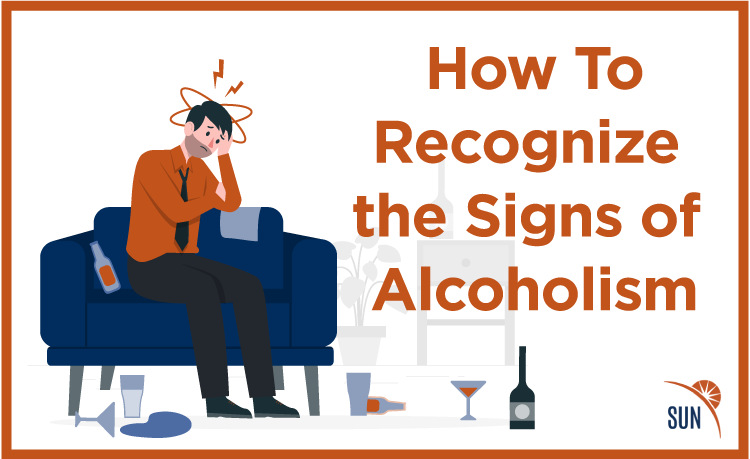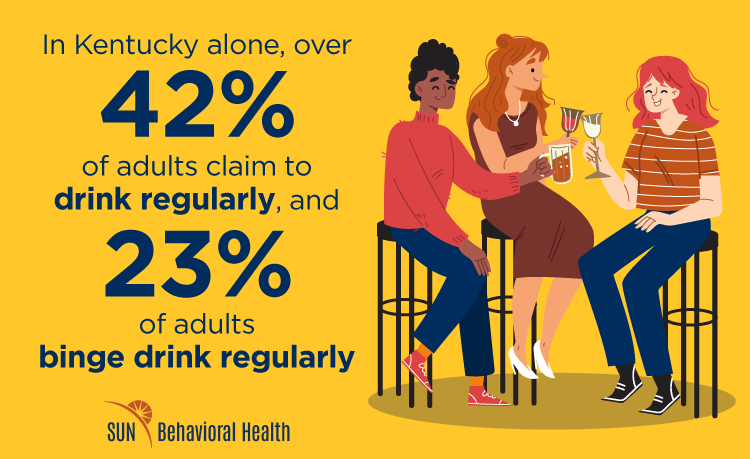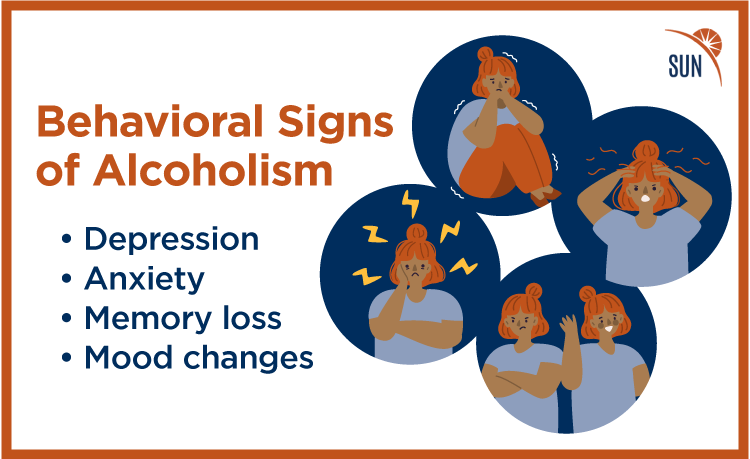Services
- Home
- Mental Health
- Who We Treat
- How We Treat
- Patients & Visitors
- About
- Lexington
close

Alcoholism, medically referred to as alcohol dependence, is what the American Psychological Association defines as a person who will “drink to excess, endangering both themselves and others.” In Kentucky alone, over 42% of adults claim to drink regularly, and 23% of adults binge drink regularly. In moderation, consuming alcohol is relatively harmless. Binge drinking is classified by the NIAAA (the National Institute on Alcohol Abuse and Alcoholism) as more than 5 drinks within 2 hours for men, or 4 drinks for women. One drink would be 1.5 ounces of spirits, 5 ounces of wine, or 12 ounces of beer, all of which contain 0.5 ounces of alcohol.
When people lose control over alcohol use, it can lead to damaging effects on their physical and mental health, cognitive functioning, professional life, and personal relationships. But what signs can you look for to identify alcohol use disorder? Here at SUN Behavioral Health Kentucky part of our goal is to break down the stigma surrounding AUD, alcoholism treatment, and educate our local community about alcohol use disorder and the signs you can look for in a loved one.
While many people with alcohol dependence go to great lengths to hide their drinking from others, there are some signs that can make you or someone you know aware that there is a problem with controlling alcohol intake.

Needing alcohol, especially in the morning - When people become dependent on alcohol, they are often unable to stop. Drinking continuously throughout the day, or in the morning, is a warning sign of alcoholism.
Experiencing withdrawal symptoms - Withdrawal symptoms can be debilitating, such as headaches, nausea, tremors, sweating, hallucinations, or a fever. So when people managing an alcohol use disorder stop drinking and experience these side effects, they may instead choose to continue drinking in an effort to avoid withdrawal.
Legal trouble due to drinking - Drinking alcohol lowers inhibitions and increases impulsivity, leading to engaging in risky behaviors while intoxicated. Legal issues, such as Driving Under the Influence (DUI) or physical assault, are warning signs that the person may be abusing alcohol or have alcohol dependence.
Harming themselves or others - People with alcoholism often put themselves or others at risk due to cognitive impairments from alcohol consumption. Drinking and driving, injuries, falls, risky sexual behaviors, fetal alcohol syndrome, and violence are warning signs of alcohol dependence in individuals.

Alcoholism has negative impacts on mental health in many ways:
Depression - While many people start using alcohol to alleviate depressive symptoms, alcohol can actually trigger depression. Alcohol depresses and slows down the nervous system. When a lot of alcohol is consumed, it can worsen existing depression.
Anxiety - When a person managing an alcohol use disorder stops drinking, their body goes into withdrawal and can cause heart palpitations or heart arrhythmia (irregular heartbeat), leading to feeling more anxiety.
Memory loss - Long-term and heavy alcohol use damages the centers of the brain that control memory, often resulting in “blackouts”. These blackouts make functioning on the job, attending family or friend events, and taking on responsibilities more challenging.
Mood changes - Alcohol slows down brain functioning and neural activity because it is a depressant. Over time, this continual slowing down of sending hormones to the brain often results in aggression, irritability, and mood swings.
What behaviors do those who are managing an alcohol use disorder have? Give common signs and symptoms of both individual behaviors and examples within the family or work - hiding bottles, drunk driving, needing to drink before stressful work activities, stopping other hobbies that don’t involve drinking, etc.
Long-term effects of alcohol dependence have damaging effects on the body:
Malnutrition - As a person continues to drink more often and in larger quantities, the care for their health diminishes. People with alcohol use disorder may have a gaunt appearance, with dark circles around their eyes or thinning hair.
Slurred speech - As alcohol persistently depresses the nervous system, it also slows the connection between the brain and the body. Slurring speech, difficulty standing or walking, or slowed reaction times can all be a result of alcohol dependence.
Liver damage - Alcohol is not a chemical our body needs to survive, so the liver recognizes it as a toxin and eliminates it. When there is a lot of alcohol consumed, the liver can become overworked trying to detox the body, resulting in damage or inflammation. Common liver diseases related to alcoholism are steatosis (fatty liver), alcoholic hepatitis, fibrosis, and cirrhosis.
There are a number of additional physical ailments that stem from alcoholism. List here. Those should be separated from signs of intoxication, like slurred speech, which would be a subsection.

Our mission is to never make you feel like a failure, no matter if that’s when you enter or when you are enrolled in IOP. It’s hard to begin, and it can be hard to maintain long-term recovery. We focus on harm reduction rather than complete abstinence because it’s been shown to help people recover.
If you or someone you know is ready to begin recovery, let us know. SUN Behavioral Health Kentucky has many pathways to recovery. Give us a call at 859-429-5188 and let’s see about starting you on the way to recovery.
What qualifies you as an alcoholic?
When a person compulsively drinks and is dependent on alcohol, they are considered an alcoholic.
What are the characteristics of an alcoholic?
One characteristic of an alcoholic is an obsession with alcohol. A person who is constantly thinking about when they can get their next drink and becomes distressed or upset when they can’t get it. The next characteristic of an alcoholic is out-of-character recklessness. Consuming alcohol lowers inhibitions, so a person who is dependent on alcohol may show signs of deliberately ignoring the safety of themselves or others, driving while under the influence of alcohol, or becoming physically aggressive. The last characteristic of an alcoholic is a significant change in priorities. When a person is dependent on alcohol, they can ignore their family and friends, hygiene, and responsibilities, if it gets in the way of drinking.
What are the symptoms of drinking too much alcohol?
Short-term symptoms of drinking too much alcohol are mental confusion, clumsiness, drowsiness, difficulty staying awake, vomiting, seizures, and slowed heart rate.
How many drinks a day is considered a sign of alcoholism?
Drink consumption, as it is related to alcoholism, depends on gender. Men have a higher tolerance for alcohol than women, so having more than 4 drinks in a day or about 14 drinks or more in a week would classify a man as an alcoholic. Women having 3 drinks or more in a day or 7 or more drinks a week would define a woman as an alcoholic.